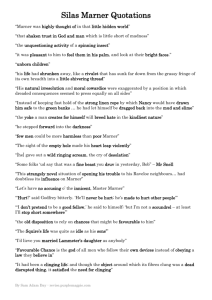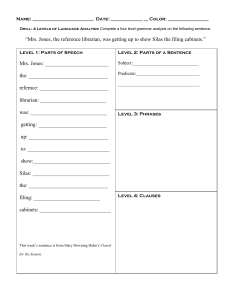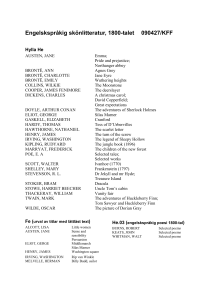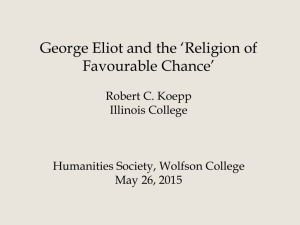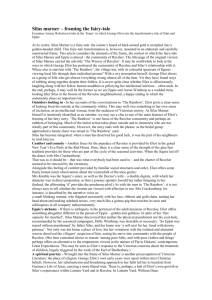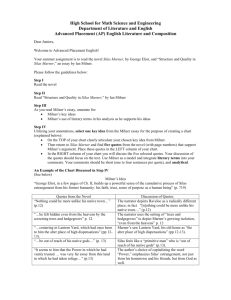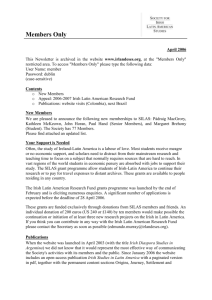Silas Marner TG
advertisement
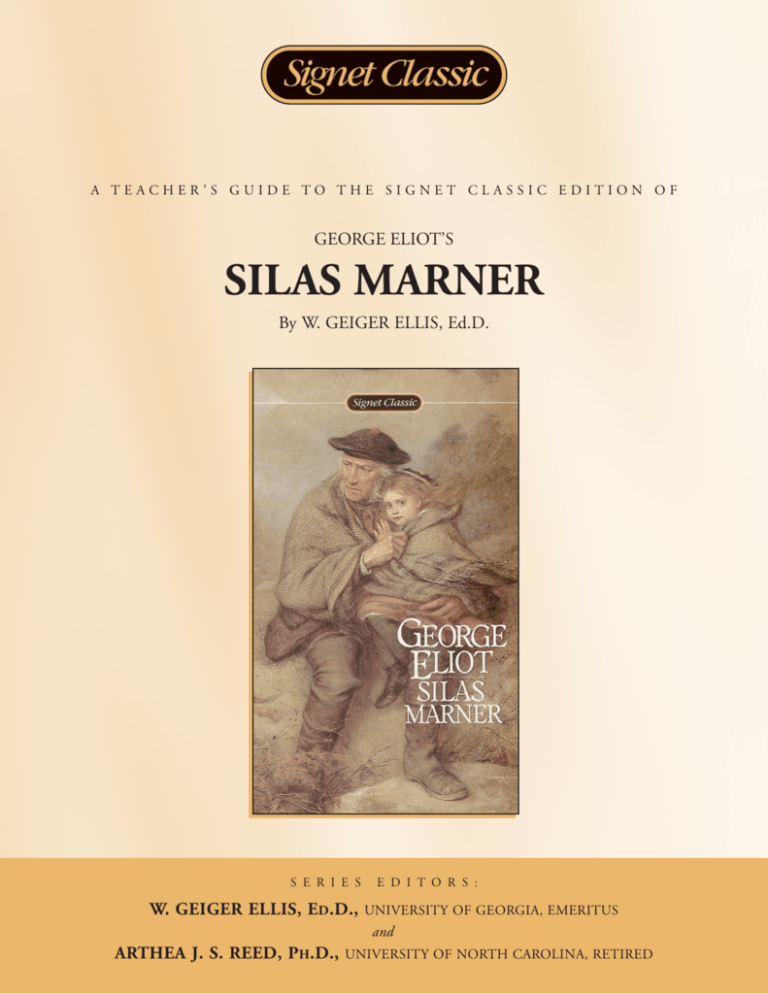
A TEACHER’S GUIDE TO THE SIGNET CLASSIC EDITION OF GEORGE ELIOT’S SILAS MARNER By W. GEIGER ELLIS, Ed.D. S E R I E S W. GEIGER ELLIS, ED.D., E D I T O R S : UNIVERSITY OF GEORGIA, EMERITUS and ARTHEA J. S. REED, PH.D., UNIVERSITY OF NORTH CAROLINA, RETIRED A Teacher’s Guide to the Signet Classic Edition of George Eliot’s Silas Marner 2 INTRODUCTION Silas Marner is an excellent selection for classroom study in the high school. While its length is easily manageable for most students, this novel is exemplary in structure, featuring intertwined major and minor plots. Likewise, various literary devices—such as foreshadowing, flashback, symbolism, irony, and characterization—are skillfully employed yet easily comprehended by young readers. However, these technical matters should not be the major focus of instruction. The setting is remote from the lives of today’s readers, just as it was somewhat quaint at the time it was written. Rather than being a limitation, this fact exemplifies the timeless nature of Silas Marner’s themes, which provide the strongest arguments for its study by today’s young people. There are dual plots, which proceed independently, touch, intertwine, and support one another, both structurally and thematically. Silas’s story of faith in humanity being lost and regained is made whole through the story of the Cass brothers. The themes themselves are interconnected, just as the plot lines merge and are mutually supportive. The importance of individual responsibility, both to oneself and to others, is examined, as are the respective roles of fate and the consequence of conscious choices. These issues are mingled with the contrast between materialism and human values. All these matters are set against differing social classes. The themes can no more be isolated and listed than can the plots be disentangled and retain their force. This intricate meshing of components marks Silas Marner as a deftly wrought work of art. This teacher’s guide contains an overview, followed by teaching suggestions to be used before, during, and after reading the novel. There are activities, discussion questions, and topics for writing assignments. Some of the ideas are designed to extend the student’s learning beyond the novel, including ways to understand and apply its themes. SILAS MARNER: AN OVERVIEW LIST OF CHARACTERS Silas Marner—Weaver around whom the story revolves. He is pale and has protuberant brown eyes. He is a simple and humble man, single minded in working for a purpose—first his religion in Lantern Yard, then for his gold, and finally for his adopted daughter Eppie. William Dane—”Friend” who betrayed the young Silas in Lantern Yard. Molly Farren—Drug-addicted, secret wife of Godfrey Cass, with whom she had the daughter later adopted by Silas. Eppie—Daughter of Godfrey Cass and Molly Farren. She was adopted and so named by Silas Marner. The Gentry Squire Cass—Holder of the highest position in Raveloe society, a solid, gruff man of “extravagant habits and bad husbandry,” generally lax in family matters. Godfrey Cass—Eldest son of the Squire, “a fine, open-faced, good-natured young man” but weak-willed, irresolute, and lacking in moral stamina. Dunstan Cass—Second son of the Squire, “a spiteful, jeering fellow,” thickset, heavy looking, selfish, and dishonest. Mr. Lammeter—A tall, erect, dignified gentleman, father of Nancy and Priscilla Lammeter. Nancy Lammeter—The village beauty, delicate and dainty, but efficient and hard working. Although a bit prim and proper, she also is generous and loving to her family and her husband Godfrey. Priscilla Lammeter—Talkative elder sister of Nancy, plain but cheerful wand with good humor and a generous spirit. Mr. Crackenthrop—The rector, who was “a merry-eyed, small-feature, gray-haired man.” Mrs. Crackenthrop—His wife, “a small, blinking woman, who fidgeted incessantly.” Mr. Osgood—Head of the village’s oldest land-owning family, and brother-in-law to Mr. Lammeter. A Teacher’s Guide to the Signet Classic Edition of George Eliot’s Silas Marner 3 Mrs. Osgood—A lady of some formality in company, but devoted to her Lammeter nieces and quietly proud of her orderly husband. Mr. Kimble—The apothecary, country doctor, a thin and agile man, “vivacious, clever, almost as devoted to his profession as to his game of cards.” Mrs. Kimble—A stout, double-chinned woman, good natured and proud of her husband’s quick with; sister of Squire Cass. Bryce and Keating—Dustan Cass’s fellow hunters. The Villagers Dolly Winthrop—The wheelwright’s wife and godmother to Eppie. A motherly, comfortable, neighborly goodwife who is hard working and content. She comforts Silas when his gold is taken, helps him raise Eppie and guides him in becoming part of village life. Aaron Winthrop—Dolly’s youngest son, the honest, hard-working young gardener whom Eppie Marries. Ben Winthrop—Dolly’s husband, the village wheelwright and leader of the church choir, and a regular at the Rainbow Inn. Mr. Snell—Landlord of the Rainbow Inn, who was always careful to take both sides of an argument or none. Bob Lundy—The butcher, cousin of Mr. Snell, “a jolly, smiling, read-haired man.” Mr. Dowlas—The farrier (veterinarian), “a man intensely opposed to compromise,” and said to be “the negative spirit in the company, and proud of the position.” Mr. Tookey—Assistant tailor and deputy clerk of the parish, generally the butt of the Rainbow crowd’s jokes. Mr. Macey—Elderly tailor and parish clerk, full of village history and gossip, a man with “an air of complacency, slight seasoned with criticism.” Jem Rodney—Molecatcher and “a known poacher, and otherwise disreputable,” whom Silas wrongly accuses of stealing the gold. Solomon Macey—The tailor’s brother, “a small, hale old man,” fiddled for the dances around the countryside. Sally Oates—Cobbler’s wife whom Silas cures. Sarah—Girl to whom Silas had been engaged in Lantern Yard. Master Kench—The constable. Justice Malam—The magistrate. SEQUENCE OF EVENTS The major events in the novel are presented below by chapter to serve as a reference for the teacher. PART I I • • • The setting is presented, describing the times and the locale. Silas Marner is introduced and described. Silas is falsely accused and leaves Lantern Yard. II • • • Silas moves to Raveloe and hoards the earnings from his weaving for fifteen years. As a result of his curing Sally Oates, the people of Raveloe consider him even more mysterious. Silas mends and keeps a small brown pot he has accidentally broken. III • • • Members of the Cass family are introduced and described. Dunstan blackmails Godfrey into selling his horse, Wildfire. Godfrey’s past is revealed. A Teacher’s Guide to the Signet Classic Edition of George Eliot’s Silas Marner 4 IV • • Dunstan sells Wildfire and then causes the horse’s death by careless riding during the hunt. Dunstan steals Silas’s gold. V • • Silas returns from an errand and discovers that his gold is missing. Silas suspects Jem Rodney and goes to the Rainbow Inn. VI • Conversation among the community members at the Rainbow Inn. VII • • • Silas enters the Rainbow Inn and accuses Jem Rodney. After learning that Jem had been at the Inn all evening, Silas apologizes to Jem and tells what he knows of the theft. It is decided to go to the ill constable’s house to have one of the men deputized to begin an investigation. VIII • • • • Dunstan fails to return home with the money from Wildfire’s sale. The villagers talk about the theft. Godfrey learns about Wildfire’s death. Godfrey contemplates confessing to his father. IX • • Godfrey tells his father, the Squire, about Wildfire. The Squire asks Godfrey about marrying Nancy Lammeter. X • • The people of Raveloe become friendlier with Silas, talking with him in town, visiting him at home, and taking him small gifts. The Winthrop family is introduced, Dolly in particular, who comes to visit with her young son, Aaron. She offers to help Silas in his housekeeping if he ever needs it. Christmas Day is spent by families among themselves; Dunstan is still missing from the Cass family. XI • • • The New Year’s celebration at the Red House gets under way with the arrival of and exchanges among the female guests. As the party proceeds, the men make conversation mainly by independent remarks. Nancy and Godfrey dance, followed by a conversation marked by assertions and defenses. XII • • • Molly comes to Raveloe to confront Godfrey and dies in the snow of a drug overdose. Molly’s child follows the light from Silas’s open cottage door and enters during his cataleptic trance. Silas regains consciousness, discovers the child, and shortly thereafter follows her tracks in the snow to her mother’s body. XIII • • • The party continues well into the night when Silas enters the Red House with Molly and Godfrey’s child. Soon after the doctor proclaims the child’s mother dead, Godfrey secretly confirms that it is his wife, Molly. Godfrey returns to the party and determines to please Nancy and pursue her. XIV • • • • Molly is buried with little ceremony. Silas undertakes raising Molly’s child with help from Dolly Winthrop. Silas is clearly possessive of the child. The child is christened and named Eppie. XV • • Godfrey keeps an eye on Eppie. Dunstan is given up as gone forever. • A Teacher’s Guide to the Signet Classic Edition of George Eliot’s Silas Marner 5 PART II XVI • • • • • Sixteen years have passed since Eppie came into Silas’s life. The effects of the passage of time on the main characters are described. Eppie gets Aaron to prepare a garden for her and Silas. Silas tells Dolly about his life in Lantern Yard. Eppie talks of marrying Aaron and their living with Silas. XVII • • Nancy’s sister, Priscilla, and their father join Godfrey and Nancy for Sunday dinner. As the sisters converse, it becomes clear that Nancy and especially Godfrey regret not having had any children. Godfrey has wanted to adopt, Nancy has not. XVIII • Godfrey finds Dunstan’s skeleton and returns to tell Nancy that his brother has drowned in the Stone Pit after robbing Silas. Godfrey goes on to confess his prior marriage and father hood of Eppie. Godfrey and Nancy decide to go together to Silas Marner’s to make the truth known. • • XIX • • • • Silas and Eppie discuss their lives after everyone has left following the excitement of finding Dunstan’s body. Nancy and Godfrey visit Silas and Eppie. Godfrey proposes taking Eppie into his home, an offer Eppie rejects. After Godfrey asserts his fatherhood and his plan to make Eppie a lady, Silas and Godfrey discuss what is best for Eppie. Eppie firmly and finally makes clear her intention to remain with Silas and working class people. • XX • Nancy and Godfrey return in silence to discuss what life has given them to accept; Godfrey decides to keep his fatherhood a secret. XXI • Silas and Eppie return to Lantern Yard, where they find things have changed greatly. Silas’s old life has been completely erased. CONCLUSION • Eppie and Aaron are married, followed by a reception at the Rainbow Inn, for which Godfrey has paid. TEACHING SILAS MARNER BEFORE READING THE NOVEL An initial exposition of the main substantive thematic issues will lead readers past surface difficulties such as the setting or some vocabulary, engaging them with the heart of the work. Ways of dealing with such possible impediments are addressed in the opening portions of “As the Novel Is Read.” Likewise, the large number of characters may be a problem for some readers. A listing activity is suggested to help these students. Students should give thoughtful consideration to at least some if the following questions. One possibility is for students to write on one or more of them and then to discuss their thoughts and feelings with classmates who chose the same questions. These discussions can be in small groups, with group responses shared with the total class for additional comment. • What are the consequences of being the victim of lies, gossip, or rumors? • If you had three minutes to evacuate your home because of a fire, what would you try to save? Explain your choices. • How does home environment influence people? Give examples. A Teacher’s Guide to the Signet Classic Edition of George Eliot’s Silas Marner 6 • What is essential for happiness? Defend your choices. • Some people are lucky while others never have good fortune. True or false? Explain. • What connections does social class have with happiness or with responsibility, both personal or social? AS THE NOVEL IS READ GETTING STARTED: The teacher’s reading of the first chapter aloud helps involve students in the novel’s action. The following questions should be written on the board for students to keep in mind as they listen: What kind of person is the main character? How is he viewed by others? Are their views justified? VOCABULARY STUDY: The class may be provided a list of words that appear in the novel but might be unfamiliar to them. Students should determine the meaning of each word by noting its use in context or by consulting a dictionary. Each word included in this list is accompanied by a chapter and page number in parentheses. The vocabulary words are as follows: remnants (I/5) colloquies (I/11) tacit (III/33) irascibility (X90) unwonted (I/5) cataleptic (I/12) vicinage (III/34) importunate (X/91) aliens (I/6) queries (I/12) judiciously (IV/35) joseph (XI/91) chary (I/6) blasphemy (I/15) felicitous (IV/38) exiguity (XI/92) flail (I/6) dropsy (II/19) cajolery (IV/39) vouchsafed (XI/101) protuberant (I/6) precursors (II/19) problematic (IV/41) epigram (XI/102) rickets (I/6) erudite (II/22) ingeniously (V/43) scarify (XI/102) rustic (I/6) revelry (II/22) farrier (VI/47) carping (XI/107) winnowing (I/6) anointing (III/24) drenched (VI/48) phial (XII/112) benignity (I/7) husbandry (III/24) preternatural (VII/59) vindictive (XII/112) phantasm (I/7) orts (III/24) impious (VIII/63) profligacy (XIII/117) rectory (I/7) unctuous (III/24) clairvoyant (VIII/64) whist (XIII/117) rectory (I/7) pillions (III/25) surmise (VIII/64) advent (XIII/118) tithes (I/7) wainscot (III/25) culpable (VIII/68) requisition (XIV/132) weathercocks (I/7) distrain (III/27) odious (VIII/68) propitatiatory (XIV/135) averred (I/8) casualties (III/30) indulgence (VIII/69) veracious (XVI/140) stile (I/8) repose (III/30) homage (IX/70) filial (XVII/154) provident (I/9) vacillation (III/30) ponderous (IX/71) contemplative (XVII/156) repugnance (I/9) conciliatory (III/31) collogue (IX/72) rectitude (XVII/157) singularities (I/9) compunction (III/32) entail (IX/72) solictude (XVII/157) accession (I/10) fetters (III/32) prevarication (IX/76) privation (XVII/158) artisan (I/10) prosaic (III/32) bereavement (X/78) fervid (I/10) rumination (III/33) dubiety (X/83) resurgent (I10) pliant (III/33) comporting (X/90) A Teacher’s Guide to the Signet Classic Edition of George Eliot’s Silas Marner 7 LISTING ACTIVITIES: Have students compile lists as they read the novel. The making of these lists serves to help focus attention on specific aspects of the novel, and the lists themselves provide a basis for some follow-up activities after the novel has been read. Either each student can compile an individual list or groups of students can work together. However once these lists are done, students will share them after they are completed. • List each mention of (1) Molly Farren and of (2) Godfrey’s actions regarding her. • Make a list of the evidence of class distinction made throughout the novel. • From time to time George Eliot includes statements of general truths about life. Make a list of these statements. • (Especially for lower-level classes) List and identify characters as they are introduced. QUESTIONS BY CHAPTER: The study of this novel is to be guided by the questions which follow. They should be made available to students before the reading of appropriate chapters to focus attention upon significant points in each chapter. In addition to providing reading guidance, they may serve as a basis for class discussions, small group work, panel presentations, writing assignments, or test reviews. They are especially useful for helping average and low-level students follow the plot. Further suggestions for their use and for classroom activities follow this list. CHAPTER I • What is Silas Marner’s vocation? • From what physical handicap does Silas Marner suffer? • How is Silas regarded by the people of Raveloe? What prompted this reaction? • What special talent do people believe Silas has? • How would you describe Silas? • Contrast Silas’s life in Lantern Yard with that in Raveloe. • Recount the incident in Lantern Yard that changed Silas’s life. • Who is William Dane? What kind of person is he? Describe his relationship with Silas. CHAPTER II • Why did Silas move to Raveloe? • How does Silas spend his time? Why? • In what ways do people cope with severe setbacks? • What did Silas do for Sally Oates? How do people respond to this act? What is the end result of Silas’s helping Sally Oates? • Describe Silas’s financial situation. • What is revealed about Silas’s nature by the brown pot incident? • Up to this time how long has Silas lived in Raveloe? CHAPTER III • Describe the social structure of the community. • What means does Eliot employ to inform us about the various characters? A Teacher’s Guide to the Signet Classic Edition of George Eliot’s Silas Marner • Describe each member of the Cass family. In particular, what weakness does Godfrey display? • Explain Godfrey’s social situation. 8 CHAPTER IV • What characteristics of Dunstan are brought out through the incidents in this chapter? • How does Dunstan justify stealing Silas’s gold to himself? • Silas’s story began in Chapter I, and the story of the Cass brothers was introduced in Chapter III. How are the two plots starting to be brought together? CHAPTER V • What were Silas’s actions and thoughts after finding his gold missing? • Compare Silas’s actions and thoughts with any you have known when something terrible or dreaded has happened. • To what does Silas turn for comfort? When had he sought comfort before from this same source? • What hope does Silas have? • What action does this hope lead him to take? CHAPTER VI • What kind of place is the Rainbow Inn? • What role does Mr. Snell, the landlord, take in discussions? • Identify and describe each person at the Rainbow Inn that evening. • What kinds of personalities are evident? • How is Raveloe like our neighborhood, community, town? Are there similar people? What place is like the Rainbow Inn? CHAPTER VIII • Describe how the story about the peddler grew. • What does the growth of this story reveal about the people of Raveloe? • Explain Godfrey’s thinking as he contemplated telling his father about his situation. • To what extent were his thoughts and fears perfectly natural? CHAPTER IX • Characterize Squire Cass’s relationship with his sons. • How different is the Squire from his sons? • To what extent might the state of the Cass home have been an influence on Godfrey and Dunstan’s lives? In particular, on their current difficulties? • What hope does Godfrey have? • How has Godfrey’s position changed? A Teacher’s Guide to the Signet Classic Edition of George Eliot’s Silas Marner CHAPTER X • How is Dunstan’s absence regarded? • What two theories about the robbery generally held? • Describe the change in the villagers’ perception of Silas. How might you account for this change? • In what ways has Silas changed? • How is Christmas spent by the Cass family? By Silas? • What event is being anticipate? What are Godfrey’s feelings about this event? CHAPTER XI • Describe Nancy Lammeter’s feelings toward Godfrey. • Characterize the thoughts and opinions held by the various ladies about each other. • Compare the two Miss Lammeters, both in appearance and in personality. • What are the respective roles of the upper and the lower social levels at the party? • Describe the talk among the men. • During the evening’s festivities, how much progress does Godfrey make in winning Nancy’s approval? • Does he have any right to try and win her approval? CHAPTER XII • What is Molly’s plan? How does it end? • What is Silas’s reaction upon finding the child? • What is the significance of Silas’s mistaking the yellow curls for his gold? • What immediate change does the child bring about in Silas? • What discovery does Silas make at the end of the chapter? CHAPTER XIII • What effect does Silas have on the gathering at the party? On Godfrey? • What is Silas’s reaction to suggestions that the child should be taken from his care? • What justification does Silas offer for wanting to keep the child? • What is Godfrey’s reaction when he recognizes Molly? • With what feelings does Godfrey return to the party? • What is your opinion of Godfrey at this time? CHAPTER XIV • How does Silas come to learn how to care for the child? • What does Silas name the child? How does he arrive at that name? • What effect does Eppie have on Silas’s life? (Consider how he spent his time and what he valued.) • Describe Silas’s efforts to discipline Eppie. 9 A Teacher’s Guide to the Signet Classic Edition of George Eliot’s Silas Marner 10 CHAPTER XV • In what ways is Godfrey a changed person? • What are Godfrey’s main interests now? What are his hopes? • What had been decided about Dunstan? CHAPTER XVI • Describe Eppie and the other major characters now that sixteen years have passed. • What changes are there in Silas’s home? • What kind of person has Eppie grown to be? Cite evidence from the novel. • What are Eppie’s plans for the future? CHAPTER XVII • Describe the changes that have taken place in the Red House. • What is Godfrey’s great unfulfilled desire? To what does he attribute this condition? • What is Nancy’s reason for not agreeing to adopt a child? • Describe Nancy’s personality and approach to life. • Overall, how successful do you believe Nancy and Godfrey’s marriage has been? CHAPTER XVIII • What discovery is made? • Why does Godfrey now confess all to Nancy? • How does Nancy handle Godfrey’s news? What does this reveal about her character? • How might such a confession be accepted today? • With what certainty can a reaction to such a confession be foretold? • What do Godfrey and Nancy decide to do? CHAPTER XIX • What are Godfrey’s arguments for adopting Eppie? Compare these arguments with those of Silas and Eppie. • What is it that Godfrey cannot understand? • Explain the mixture of feelings that Silas must have experienced. • How fully does Eppie comprehend the significance of her decision? • To what extent is Eppie’s decision influenced by the social structure of Raveloe? CHAPTER XX • What decisions are made by Godfrey? • What reasons might he have for these decisions? • Describe the state of Nancy and Godfrey’s relationship. To what extent has Eppie’s stand affected their relationship? • What changes are evident in Godfrey’s character? What has he learned? A Teacher’s Guide to the Signet Classic Edition of George Eliot’s Silas Marner 11 CHAPTER XXI • What do Silas and Eppie find when they return to Lantern Yard? • What significance does this chapter have to the novel as a whole? • What statement does Silas make that clearly shows the change he has undergone? CONCLUSION • What contributions do Godfrey and Nancy make to Eppie’s wedding? • Why do they not attend the festivities? • What sort of day do you suppose Eppie’s wedding day is for Godfrey? ACTIVITIES BY CHAPTER: These questions should not always be dealt with in the same way. Certainly on some days they may be discussed by the entire class; however, this procedure soon would become tiring. The questions to some chapters may be best discussed in small groups of five or six students each. Usually these groups will have a reporter who will relate the group’s conclusions to the entire class. Sometimes these reports may be written. At other times individual students may write answers to questions calling for opinions. A few students may be selected to conduct a panel discussion before the class. Other activities may include the oral reading of character parts in particular scenes. Of course, this necessitates student preparation for a successful performance. Here is one possible plan for the incorporation of these activities into the study of specific chapters: Chapter I II III IV V VI VII VIII IX X XI XII XIII XIV XV XVI XVII XVIII XIX XX XXI Conclusion Activity Oral reading by teacher; teacher-led discussion Teacher-led class discussion Small group discussion Mime presentation of Dunstan from his approach to Silas’s cottage through his departure; small group discussions. Journal writing (Individual responses to the questions are written during and after the reading of this chapter.) Readers theater presentation of Rainbow Inn scene (Selected students, after a brief practice session, read aloud the various characters’ parts to the class; teacher-lead class discussion.) Readers theater presentation of Rainbow Inn scene; teacher-led class discussion. Panel discussion Panel discussion Teacher-led class discussion Oral reading of parts by students; teacher-led class discussion Teacher-led class discussion Teacher-led class discussion Small group discussion Small group discussion Teacher-led class discussion Small group discussion Small group discussion Teacher-lead class discussion Written answers by individual students Teacher-led class discussion Teacher-led class discussion A Teacher’s Guide to the Signet Classic Edition of George Eliot’s Silas Marner 12 AFTER READING THE NOVEL Only after the entire novel has been read can a thorough consideration be given to the most meaningful issues it explores. Here are suggestions for following up on earlier activities and for the consideration of more general matters. FOLLOW-UP ON THEME ACTIVITIES: Before reading was begun, students were asked to respond to a number of questions. Now they can consider these same questions in relation to the novel and its characters. They also may wish to compare their earlier responses in light of their reading experience. Here is that list of questions: • What are the consequences of being the victim of lies, gossip, or rumors? • If you had three minutes to evacuate your home because of a fire, what would you try to save? Explain your choices. • How does home environment influence people? Give examples. • What is essential for happiness? Defend your choices. • Some people are lucky while others never have good fortune. True or false? Explain. • What connections does social class have with happiness or with responsibility, both personal or social? FOLLOW-UP ON LISTING ACTIVITIES As students read the novel, they were asked to compile certain lists. Now they may consider the following questions in light of the novel and its characters. Students should share their individual lists and arrive at composite lists. Here are the questions to be considered in relation to each list: • List each mention of (1) Molly Farren and of (2) Godfrey’s actions regarding her. What is your assessment of Godfrey in relation to Molly? Should Godfrey have confessed everything to Nancy before he asked her to marry him? • Make a list of the evidence of class distinction made throughout the novel. What class distInctions are evident in our society today? Compare the distinctions made in the novel with those found today. • From time to time George Eliot includes statements of general truths about life. Make a list of these statements. For each statement explain how that truth operated in the novel. Cite examples of their operation in today’s world. QUESTIONS FOR DEEPER UNDERSTANDING: The following questions can be used as reading journal topics, essay topics, the basis for oral reports, or class discussion starters. • What are the causes of social isolation? • To what extent are these causes externally imposed? Self-imposed? • What are the individual effects of social isolation? On the group from which the person is isolated? • What are some examples of social isolation operating in our world and society today? Include examples of both group-imposed and self-imposed isolation. What are their intended purposes? What are their actual results? • Generally speaking, people get what they deserve, for better or worse. True or false? Support your stand. To what degree did this rule apply to characters in this novel? • Which characters underwent change? What brought about these changes? • How would Molly’s death be regarded today, and how would it be handled? • How would the issues raised in this novel be modified if the setting were changed to the modern world? • What are the respective roles of material wealth, social interaction, and social position in the attainment of happiness? A Teacher’s Guide to the Signet Classic Edition of George Eliot’s Silas Marner 13 • What are the advantages and disadvantages of practicing deceit and secrecy? What public figures have you known to use such practices? What were the results? • What are the benefits and consequences of accepting and meeting responsibilities? Cite examples of people who have either met or not met their responsibilities. • It has been said that givers are enriched by giving. How did this principle operate in Silas Marner? In what way have you seen it work in your experience? • To what extent are Godfrey and Dunstan’s shortcomings attributable to their home life? To their own irresponsibility? After what point should young people no longer attribute their difficulties to their parents or to society? • On the subject of adoption, who do you agree with most, Godfrey or Nancy? Why? To what extent do your reasons hold for adoption in general? • It has been said that people need people. It this true? To what extent do people also need time to be alone? Why? What is a proper balance between these two needs? • What role does fate play in our lives? To what extent do people command their own fate? ADDITIONAL FOLLOW-UP ACTIVITIES: Students should be given a choice of activities, which may be undertaken individually or in groups. At least one day can be set aside for performances and sharing of student products. WRITING ACTIVITIES • Rewrite the story of Silas Marner in a different time period. You may set it in the present or the future. Also, you may choose to rewrite only a particular event or segment of the story. • Put together a cast for a film version of Silas Marner. The director-producer wants you as casting director to make recommendations. Decide who would be the actor and actresses. Include photos and descriptions of the stars and tell why each is “perfect” for the part. Write a report to convince the producer of your selections. • Write letters that may have been sent between characters in Silas Marner or at some specified time in the future. • Write a poem that one of the characters might have written. Make clear your understanding of the character’s personality by writing a poem that expresses the way he or she feels about what is happening to him or her in the book. • Write newspaper/TV news stories about main events in the novel. This activity may center on human interest stories or climatic events in the novel. A group of students could collaborate to create an entire special edition of The Raveloe Times. • Write up an interview with George Eliot to publish in a magazine (such as Rolling Stone). Conduct research to find out all you can about George Eliot; then, base your interview questions and answers on the information you found. Include questions about George Eliot’s background as well as about her writing. Example: a) Tell a little about yourself. b) Why did you write the story? c) Is the book based on personal experience or on a real person you have known? • Imagine you are one of the main characters in Silas Marner and write a diary that person might have kept for a few days or weeks. • Make a gift list for each of the major characters. Explain your reasons for giving particular gifts to particular characters. Gifts may be abstract or tangible. DRAMATIC ACTIVITIES • Prepare and deliver or tape an editorial comment, as might be given on radio or TV, on actions of the characters and implications of that action for society. A variation of this would be to have a simulated “call-in” radio show with a newscaster accepting editorial comments from the listening audience. • Have a panel of characters from Silas Marner debate a contemporary social or political issue from their differing viewpoints. All questions/viewpoints should be written out ahead of time. A Teacher’s Guide to the Signet Classic Edition of George Eliot’s Silas Marner • 14 Dress and make up as a character in Silas Marner. Prepare and present an original soliloquy that the character might give. A variation is to assume the role of a minor character, describe and react to a major character in the novel; including responses, feelings, and biases that are appropriate to the minor character. ARTS & CRAFTS ACTIVITIES • Make a scale mode of a scene or a setting in Silas Marner. Pay close attention to details given in the novel in order to create a realistic model. Silas’s cottage by the Stone Pit, the Red House, or the Rainbow Inn are good subjects. • Draw a map which illustrates the setting, follows the physical movement of a character(s), or traces the emotional growth of a character(s). Label important places or stages of character development. A variation is to build the map using flour paste with food coloring. • Make a weaving or tapestry that portrays some aspect of Silas Marner. These may used as wall hangings. • Make a diorama or shadow box depicting a setting, theme, or characters from Silas Marner. Shoe boxes are ideal for this project. Molly’s death scene, the “staking” of Wildfire, and Eppie’s wedding lend themselves well to this project. • Convert the events of Silas Marner into a ballad or song. Write the lyrics and music or adapt words to a melody by someone else. EXAMINING THE AUTHOR’S CRAFT: Students may be brought to some appreciation of Eliot’s skill through a set of activities that can be completed in a relatively short time. What follows is a suggested activity for each of four literary elements and devices. A class may be divided into four groups, each undertaking one of these activities. Then each group can report its findings to the entire class. PLOT List the events in the major plot, Silas’s story. Next list the events in the minor plot, the Cass brother’s story. Then chart both of these story lines showing where the two meet each time they do. (Because this may be the easiest of this set of activities, less able students may be assigned to it.) FORESHADOWING Now that the events are known, skim back over the novel and note as many examples of foreshadowing as you can. A few are noted below: (The ability of the students may dictate how many examples need to be given.) • “Not that the idea of being robbed presented itself often or strongly to his mind…” • The brown pot incident: “Yet even in this stage of withering a little incident happened, which showed that the sap of affection was not all gone.” • “…it’ud be saving time if Molly should happen to take a drop too much laudanum someday, and make a widower of you.” • “She’s been threatening to come herself and tell him.” • “And take care to keep sober tomorrow, else you’ll get pitched on your head coming home, and Wildfire might be the worse for it.” • “Dunstan’s own recent difficulty in making his way suggested to him that the weaver had perhaps gone outside…and had slipped into the Stone Pit.” • “Before such calm external beauty the presence of a vague fear is more distinctly felt—like a raven flapping its slow wing across the sunny air.” A Teacher’s Guide to the Signet Classic Edition of George Eliot’s Silas Marner 15 IRONY Think back over the novel and list as many examples of irony as you can. A few are noted below: (The ability of the students may dictate how many examples need to be given.) • Curing Sally Oates ultimately resulted in Silas’s being rejected by the townspeople. • Dunstan brags that whenever he falls he lands on his feet. • Godfrey thinks that Dunstan would never be hurt, yet he was, by then, dead. • Nancy Lammeter, who is prim and proper, is courted by a married man. • Eppie replies to Godfrey that she can never leave her “father.” SYMBOLISM List and explain the symbolism Eliot uses in Silas Marner. Here are two examples: • Eppie’s golden hair, mistaken for the god returned, was that of a child who became a treasure more precious than the gold. • The open door of Silas’s cottage was the way to ruin for Dunstan, the way of refuge for Eppie, and the door of hope for Silas. BIBLIOGRAPHIES PROFESSIONAL ARTICLES ON TEACHING SILAS MARNER Crawford, Meda Bonne. “Silas Marner is Fun,” The English Journal, XL (June, 1951), p. 338. Heilman, Robert B. “Return to Raveloe: Thirty-Five Years After,” The English Journal, XLVI (January, 1957), pp. 1-10. McKenzie, Lucy Ann. “More Fun with Silas Marner,” The English Journal, XLI (January, 1952) p.41. Sullivan, Sister Bede. “Silas Marner Letters,” The English Journal, XLII (November, 1953), p. 463. BOOKS ON THE SETTING Mitchell, Rosemand, and Mary Leys. History of the English People. New York: Longmans, Green & Company, Inc. Quennell, Marjorie, and H.B. Charles. Everyday Things in England. Volumes 1 and 3. New York: G.P. Putnam’s Sons. Street, Alicia. Land of the English People. Revised edition. Philadelphia: J.B. Lippincott Company. Tickner, F.W. Social and Industrial History of England. New York: St. Martins Press, Inc. Trevelyan, G.M. Illustrated English Social History. Volumes 1 and 4. New York: Longmans, Green & Company Inc. Williams-Ellis, Anabel, and Frederick J. Fisher. The Story of English Life. New York: Coward-McCann, Inc. ARTICLES ON THE AUTHOR James, Jr., Henry. “Life of George Eliot,” Atlantic Monthly, May, 1885. Myers, Frederic W.H. “George Eliot,” Century, November 1881 Stephen, Leslie. “George Eliot,” Dictionary of National Biography, Volume 8, pp. 216-222. ABOUT THE EDITORS OF THIS GUIDE W. GEIGER ELLIS, Professor Emeritus, University of Georgia, received his A.B. and M.Ed. degrees from the University of North Carolina (Chapel Hill) and his Ed.D. from the University of Virginia. His teaching focused on adolescent literature, having introduced the first courses on the subject at both the University of Virginia and the University of Georgia. He developed and edited The ALAN Review. ARTHEA (CHARLIE) REED, PH.D. is currently a long-term care specialist with Northwestern Mutual Financial Network and senior partner of Long-Term Care and Associates. From 1978 to 1996 she was a professor of education and chairperson of the Education Department at the University of North Carolina at Asheville. She is the author or co-author of 15 books in the fields of adolescent literature, foundations of education, and methods of teaching. She was the editor of The ALAN Review for six years and president of the Assembly on Literature for Adolescents of the National Council of Teachers of English (ALAN). She is currently co-authoring the 5th edition of A Guide to Observation, Participation, and Reflection in the Classroom (McGraw-Hill 2004). She has taught almost every grade from second grade through doctoral candidates. She lives in Asheville, North Carolina with her husband Don, two dogs, and a cat. FREE TEACHER’S GUIDES A full list of Teacher’s Guides and Teacher’s Guides for the Signet Classic Shakespeare Series is available on Penguin’s website at: www.penguin.com/academic TEACHER’S GUIDES Animal Farm • Anthem • Beloved • Beowulf • The Call of the Wild • Cannery Row • City of God • The Country of the Pointed Firs and Other Stories • The Crucible • Death of a Salesman • Dr. Jekyll and Mr. Hyde • Dubliners • Ethan Frome • The Fountainhead • Girl in Hyacinth Blue • The Grapes of Wrath • A Journey to the Center of the Earth • The Jungle • The Life of Ivan Denisovich • Looking Backward • Lysistrata • Main Street • Of Mice and Men • The Mousetrap and Other Plays • A Narrative of the Life of Frederick Douglass, An American Slave • Nectar in a Sieve • 1984 • The Odyssey • The Passion of Artemisia • The Pearl • Persuasion • The Prince and the Pauper • A Raisin in the Sun • The Red Pony • Redwall • The Scarlet Letter • The Scarlet Pimpernel • Silas Marner • A Tale of Two Cities • The Time Machine • Up from Slavery • The Women of Brewster Place • Wuthering Heights TEACHER’S GUIDES FOR THE SIGNET CLASSIC SHAKESPEARE SERIES Antony and Cleopatra • As You Like It • Hamlet • Henry V • Julius Caesar • King Lear • Macbeth • Measure for Measure • A Midsummer Night’s Dream • Much Ado About Nothing • Othello • Richard III • Romeo and Juliet • The Taming of the Shrew • The Tempest • Twelfth Night Visit the Penguin Group (USA) web site at www.penguin.com to browse all Signet Classic paperback editions and www.penguin.com/scessay for information about the Annual Signet Classic Scholarship Essay Contest
